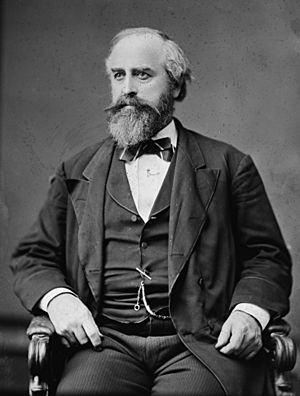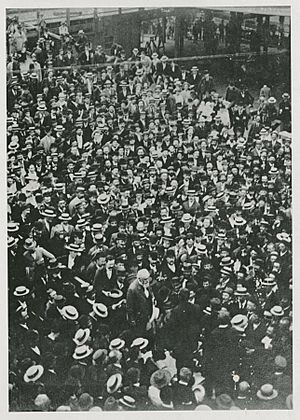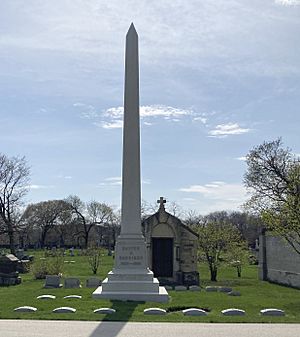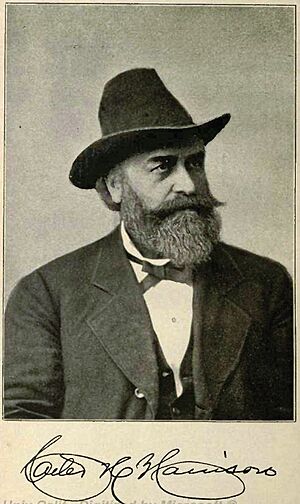Carter Harrison Sr. facts for kids
Quick facts for kids
Carter Harrison
|
|
|---|---|
 |
|
| Mayor of Chicago | |
| In office April 17, 1893 – October 28, 1893 |
|
| Preceded by | Hempstead Washburne |
| Succeeded by | George Bell Swift (acting) |
| In office April 28, 1879 – April 18, 1887 |
|
| Preceded by | Monroe Heath |
| Succeeded by | John A. Roche |
| Member of the U.S. House of Representatives from Illinois's 2nd district |
|
| In office March 4, 1875 – March 3, 1879 |
|
| Preceded by | Jasper D. Ward |
| Succeeded by | George R. Davis |
| Member of the Cook County Board of Commissioners | |
| In office 1874–1875 |
|
| Personal details | |
| Born |
Carter Henry Harrison
February 15, 1825 near Lexington, Kentucky, U.S. |
| Died | October 28, 1893 (aged 68) Chicago, Illinois, U.S. |
| Resting place | Graceland Cemetery |
| Political party | Democratic |
| Spouses | Margarette Stearns, Sophonisba Grayson Preston |
| Children | 10, including Carter |
| Education | Yale University (BA) Transylvania University (LLB) |
| Signature | |
Carter Henry Harrison Sr. (born February 15, 1825 – died October 28, 1893) was an important American politician. He served as the mayor of Chicago, Illinois, for many years. He was mayor from 1879 to 1887, and then again in 1893. Sadly, he was killed before he could finish his last term. Before becoming mayor, he was also a member of the United States House of Representatives. Carter Harrison Sr. was related to two U.S. Presidents: he was a distant cousin of William Henry Harrison and his grandson, Benjamin Harrison. His own son, Carter Harrison Jr., also became mayor of Chicago, following in his father's footsteps.
Contents
Early Life and Education
Carter Henry Harrison Sr. was born on February 15, 1825, near Lexington, Kentucky. His father passed away when Carter was just a baby.
His family had a long history in the southern United States, going back to the early days of Virginia.
Carter was taught by private teachers at home. He later went to Yale College and graduated in 1845. After college, he traveled and studied in Europe from 1851 to 1853. Then, he went to Transylvania College in Lexington, where he earned a law degree in 1855. He became a lawyer that same year and started working in Chicago. He moved his family to Chicago in 1855 because he saw it as a place with many chances for success. He had inherited a plantation and many enslaved people in Kentucky, but he sold it all because he wanted to be done with slavery.
Harrison was smart with money and invested in land in Chicago. This helped him become very wealthy.
After the terrible Great Chicago Fire in 1871, he became interested in politics. He even convinced Joseph Medill to run for mayor in 1871. Later, Medill, who owned the Chicago Tribune newspaper, became a political opponent of Harrison's.
Early Political Career
In 1872, Harrison tried to get elected to the U.S. Congress but didn't win. From 1874 to 1876, he served as a member of the Cook County Board of Commissioners, which helps run the county.
Time in Congress (1875–1879)
In 1874, Harrison was elected to the U.S. Congress as a Democrat. He was reelected in 1876.
During his second term, some questions arose about payments to a few people who claimed to be injured war veterans, even though their claims had been turned down before.
He was known for his exciting speeches while in Congress.
In 1878, Harrison lost his bid for reelection to Congress.
First Time as Mayor (1879–1887)
Carter Harrison Sr. was elected mayor of Chicago four times in a row. He won elections in 1879, 1881, 1883, and 1885. Each term lasted two years.
When he campaigned in 1879, he had a pet eagle with him. Because of this, people started calling him "the Eagle."
He officially became mayor for the first time on April 28, 1879.
During his first time as mayor, he served longer than any mayor before him.
Leadership and Popularity
People said Harrison had a special way of leading that made people want to follow him. He worked with different groups within the Democratic Party to run the city.
Many business owners and working-class people supported Harrison. However, some middle-class religious groups generally didn't approve of him.
City Improvements and Safety
When Harrison first became mayor, Chicago had almost half a million people. But it was still growing and needed a lot of work. Harrison once said that when he started, "there were not ten miles of paved street in the whole city." He loved Chicago and often called it his "bride."
He greatly increased the number of paved roads and sidewalks in the city's downtown area. He also made the fire department bigger and better. Harrison made utility companies in the city center bury their wires underground. He also fought against the Illinois Central Railroad's claim to the lakefront, even taking the case to the Supreme Court of the United States. He also tried to get railroads to raise their tracks to avoid dangerous street crossings. He wanted the city to build new, longer pipes for its public water system.
Haymarket Affair
During Harrison's first time as mayor, Chicago gained a lot of attention for different events. One important event was the Haymarket affair in 1886. On the evening it happened, Harrison had seen a peaceful gathering of workers and advised the police to leave them alone. He then left the area before things turned violent.
Harrison was a Protestant, but he worked hard to get votes from the city's large Catholic population and growing number of trade union members. His government seemed more supportive of workers' unions and strikes than previous mayors.
Harrison was a delegate at the Democratic National Conventions in 1880 and 1884. At the 1884 convention in Chicago, he supported Grover Cleveland, who successfully ran for president. Harrison even gave a speech to support Cleveland's nomination.
1884 Governor Campaign
In 1884, Harrison ran to become the governor of Illinois as a Democrat. He lost to Richard J. Oglesby, a Republican.
End of First Term
Harrison's time as mayor officially ended on April 18, 1887.
Time Away from Politics
After his first time as mayor, Harrison took a break from politics. He went on a long trip around the world for 16 months.
In 1890, Harrison and his daughter went on a vacation to Yellowstone National Park and Alaska. He wrote letters about his trip, which were first printed in the Chicago Tribune newspaper. Later, these letters were put into a book called A Summer's Outing and The Old Man's Story in 1891.
After leaving office, Harrison also owned and edited the Chicago Times newspaper from 1891 to 1893. Through the newspaper, he continued to support labor unions and the many different immigrant communities in Chicago.
Harrison married Margarette E. Stearns in 1882. His first wife had passed away in 1876. Margarette was the daughter of an important Chicago pioneer named Marcus C. Stearns.
Unsuccessful 1891 Mayor Campaign
Harrison tried to become mayor again in the 1891 Chicago mayoral election, but he did not win.
Second Time as Mayor (1893)
Harrison was re-elected mayor in 1893. This was just in time for the World's Columbian Exposition, a huge world's fair being held in Chicago. He wanted to show the world the "true" Chicago. He had a plan to make the Democratic Party in Chicago stronger and more organized.
He officially started his fifth term as mayor on April 17, 1893.
Assassination


On October 28, 1893, just a few months into his fifth term, Carter Harrison Sr. was murdered in his home. This happened only two days before the World's Columbian Exposition was supposed to close. He was killed by a man named Patrick Eugene Prendergast, who was upset because he had supported Harrison's election but didn't get a job in the mayor's office as he expected.
Harrison was buried in Chicago's Graceland Cemetery. As part of his funeral, his body lay in state at City Hall, allowing people to pay their respects. A big celebration planned for the end of the World's Fair was canceled and replaced with a large public memorial service for Harrison. Prendergast was found guilty of the crime and was executed on July 13, 1894.
Even though some wealthy and Republican people didn't like Harrison when he died, he always had strong support from labor unions, Catholic communities, immigrants, and working-class people. He was the first mayor of Chicago to be elected five times. Later, his son, Carter Harrison Jr., also became mayor five times.
Political Beliefs
Harrison was a populist Democrat. This means he often supported the common people.
He believed that the city's strength came from its many different neighborhoods.
Personal Life
In 1855, Harrison married his first wife, Sophie Preston. They had ten children together, though some of them died when they were young. Sophie passed away in Europe in 1876.
After his first wife died, Harrison married Margarette E. Stearns in 1882. She also passed away in 1887, leaving him a widower again.
At the time he was killed, Harrison was engaged to a young woman from New Orleans named Annie Howard.
Legacy
The Carter H. Harrison Medal is a special award given to police officers and firefighters in Chicago. It's given for brave actions that protect people's lives or property.
See also
 | Misty Copeland |
 | Raven Wilkinson |
 | Debra Austin |
 | Aesha Ash |


